wisconsin
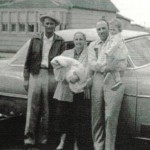
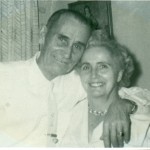 I was born in Superior, Wisconsin and at that time, I had one grandfather, George Byer, who was my mother, Collene Spencer’s dad. My grandfather and grandmother, Hattie Byer lived in Casper, Wyoming, where my mom was born, and where our family would eventually move back too. Sometimes, I wonder if my grandparents were happy about having us moving back. It wasn’t that they weren’t happy to have us closer, but now they didn’t have an excuse to visit the beautiful Wisconsin area.
I was born in Superior, Wisconsin and at that time, I had one grandfather, George Byer, who was my mother, Collene Spencer’s dad. My grandfather and grandmother, Hattie Byer lived in Casper, Wyoming, where my mom was born, and where our family would eventually move back too. Sometimes, I wonder if my grandparents were happy about having us moving back. It wasn’t that they weren’t happy to have us closer, but now they didn’t have an excuse to visit the beautiful Wisconsin area.
Grandma and Grandpa made a few trips up to see us, as did my Aunt Sandy Pattan and possibly some of my other aunts and uncles, and they always had a wonderful time. I don’t think you could gage kept my grandpa away, because when it came to kids, he was a big softie. About the time he knew he had a new grandbaby, he was ready to go.
Grandpa was the same way with his own kids. He loved coming home from work to have all of his children around him. The girls would often comb his hair, and even paint his fingernails. If his buddies at work ever laughed about that, he didn’t say, and I doubt he cared. I’m sure he just likes having the attention his kids loved to give him, 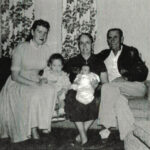
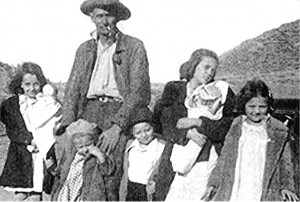 especially after a long hard day at work. The evenings were often spent listening to the radio or reading a book out loud so the whole family could hear. They also sang, and after Aunt Dee bought the old piano, maybe they played that, although I don’t think anyone really knew how. Nevertheless, evenings were for family time, and Grandpa loved it. Today marks the 130th anniversary of my grandpa’s birth. Happy birthday in Heaven, Grandpa Byer. We love and miss you very much.
especially after a long hard day at work. The evenings were often spent listening to the radio or reading a book out loud so the whole family could hear. They also sang, and after Aunt Dee bought the old piano, maybe they played that, although I don’t think anyone really knew how. Nevertheless, evenings were for family time, and Grandpa loved it. Today marks the 130th anniversary of my grandpa’s birth. Happy birthday in Heaven, Grandpa Byer. We love and miss you very much.
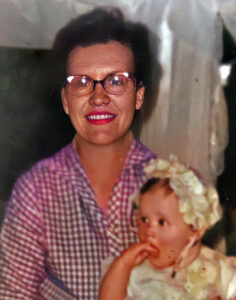
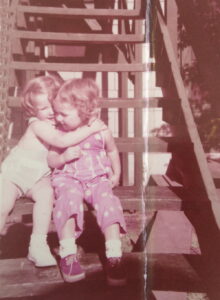 My aunt, Doris Spencer has a heart of gold. She is the type of person who always wanted to make sure everyone else had what they needed and that they were comfortable. It never mattered what time our family might pull into town for a visit. Even at midnight, she would get up and make us something to eat. It might just be a little snack, but she just always felt like we needed a little something after our travels. Aunt Doris is a great cook, although she doesn’t do much cooking these days. Nevertheless, I wish I had even a tenth of the amazing recipes that are stored in her head.
My aunt, Doris Spencer has a heart of gold. She is the type of person who always wanted to make sure everyone else had what they needed and that they were comfortable. It never mattered what time our family might pull into town for a visit. Even at midnight, she would get up and make us something to eat. It might just be a little snack, but she just always felt like we needed a little something after our travels. Aunt Doris is a great cook, although she doesn’t do much cooking these days. Nevertheless, I wish I had even a tenth of the amazing recipes that are stored in her head.
Aunt Doris has always been a happy person, and she has shared her sunny attitude with everyone who knew her. She quickly became my mom, Collene Spencer’s best friend, when Mom and my dad, Al Spencer moved from Casper, Wyoming to Superior, Wisconsin following their wedding in 1953. My mom was a young woman, living 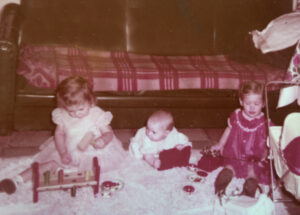 away from her family for the first time ever, and that can be more than a little scary, but Aunt Doris was there, and lived just across the back yard. Uncle Bill Spencer (my dad’s brother) and Aunt Doris owned both houses, and my parents rented from them. It was truly a blessing for my mom to have Aunt Doris so nearby.
away from her family for the first time ever, and that can be more than a little scary, but Aunt Doris was there, and lived just across the back yard. Uncle Bill Spencer (my dad’s brother) and Aunt Doris owned both houses, and my parents rented from them. It was truly a blessing for my mom to have Aunt Doris so nearby.
The two girls hung out together. Their daughters, Cheryl Masterson and later me, and our cousin, Pam Wendling (Aunt Doris’ oldest child) played together. Before there was a chance for the rest of our siblings to be on those playdates, my parents, my sister, and I moved back to Casper, Wyoming. That was a sad day all around. Our life was going to be in Wyoming, and I can’t imagine it any other way now, but Aunt Doris and her family’s life was in Superior, Wisconsin. It was the way it would be, and from that day on, we visited as much as we could, as did they. For Aunt Doris and my mom, it was especially sad, because they truly were best friends. They did everything together, and they would miss each other very, very much.
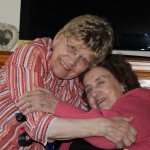
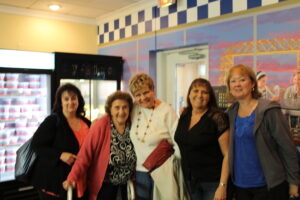 My mom is in Heaven now, but before she went home, my sister, Cheryl and I took her back to Wisconsin to see our precious family. It was such a blessed trip, and it was especially a blessing to see these two wonderful sisters-in-law and friends together again. It had been far too many years by then, so the time was especially precious to all of us, especially my mom. Today is Aunt Doris’ 99th birthday. Happy birthday Aunt Doris!! Have a wonderful day!! We love you!!
My mom is in Heaven now, but before she went home, my sister, Cheryl and I took her back to Wisconsin to see our precious family. It was such a blessed trip, and it was especially a blessing to see these two wonderful sisters-in-law and friends together again. It had been far too many years by then, so the time was especially precious to all of us, especially my mom. Today is Aunt Doris’ 99th birthday. Happy birthday Aunt Doris!! Have a wonderful day!! We love you!!
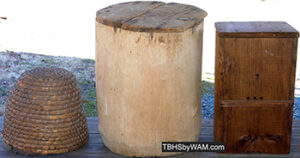 People have been eating honey since ancient times. The early connoisseurs of honey weren’t beekeepers, but rather foragers. It stands to reason that at some point people were going to want to have their own supply of honey, and with that beekeeping was born. So, how were they going to have a continuing supply of the honey they loved? Enter the apiary. I didn’t know the meaning of an apiary until my 1st cousin once removed, Larry Cameron got into beekeeping. I had never known anyone who was a beekeeper before, but in my opinion, you would have to be brave to do that job…brave or have the right equipment, I guess.
People have been eating honey since ancient times. The early connoisseurs of honey weren’t beekeepers, but rather foragers. It stands to reason that at some point people were going to want to have their own supply of honey, and with that beekeeping was born. So, how were they going to have a continuing supply of the honey they loved? Enter the apiary. I didn’t know the meaning of an apiary until my 1st cousin once removed, Larry Cameron got into beekeeping. I had never known anyone who was a beekeeper before, but in my opinion, you would have to be brave to do that job…brave or have the right equipment, I guess.
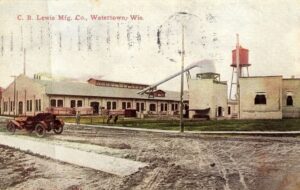
In 1863, a man named G.B. Lewis founded G.B. Lewis Company with the idea of supplying these beekeepers with the necessary beeware to run their businesses. Beeware was a term I really hadn’t heard before, but when I looked it up, it made sense. Beeware, of course, refers to the equipment used by beekeepers. Hives, in 1863, came in three forms…a skep, a log hive, and a box hive. The skep, which was a tightly woven basket, was used the oldest style, but it became obsolete in America, probably because there was plenty of wood to use. G.B. Lewis Company was known for many years as the world’s largest manufacturer of beeware.
Then on April 25, 1890, disaster struck. At 2:30am on that Saturday morning, a huge fire occurred in the city. 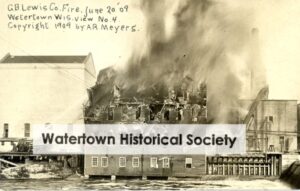 Because the fire was so destructive, it appeared that a large portion of the west side if the city would be destroyed. At G.B. Lewis Company, the entire box, beehive, and section factory was destroyed, along with the Watertown Woolen Mills, owned by Mrs James Chapman. The damage to the G.B. Lewis Company was about $15,000, but it was only insured for $4,500, and at that time there was no guaranteed replacement. Next door to the G.B. Lewis Company and the Watertown Woolen Mills, were two large lumberyards, the Empire flour mills, and several frame buildings. These were apparently saved in the end due to the hard work of the fire department. The origin of the fire is remains unknown to this day.
Because the fire was so destructive, it appeared that a large portion of the west side if the city would be destroyed. At G.B. Lewis Company, the entire box, beehive, and section factory was destroyed, along with the Watertown Woolen Mills, owned by Mrs James Chapman. The damage to the G.B. Lewis Company was about $15,000, but it was only insured for $4,500, and at that time there was no guaranteed replacement. Next door to the G.B. Lewis Company and the Watertown Woolen Mills, were two large lumberyards, the Empire flour mills, and several frame buildings. These were apparently saved in the end due to the hard work of the fire department. The origin of the fire is remains unknown to this day.

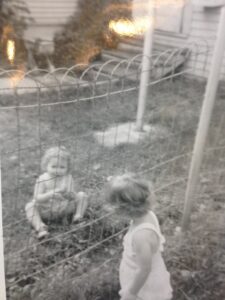 When my mom, Collene Spencer got married, she and my dad, Allen Spencer, for their honeymoon, moved to Superior, Wisconsin. While mom grew up in a big family, and knew how to cook, moving to a new area was a way to experience new foods. Mom was a little lonely when she first moved to Wisconsin, but when she arrived, she found her new best friend, her sister-in-law, Doris Spencer. They actually lived across the yard from each other. There wasn’t an alley between them, just a fence. It was a very cozy place for the two families, and as the kids came along, it made it easy to play without worrying about the little ones getting out into the street.
When my mom, Collene Spencer got married, she and my dad, Allen Spencer, for their honeymoon, moved to Superior, Wisconsin. While mom grew up in a big family, and knew how to cook, moving to a new area was a way to experience new foods. Mom was a little lonely when she first moved to Wisconsin, but when she arrived, she found her new best friend, her sister-in-law, Doris Spencer. They actually lived across the yard from each other. There wasn’t an alley between them, just a fence. It was a very cozy place for the two families, and as the kids came along, it made it easy to play without worrying about the little ones getting out into the street.
During the frequent luncheons Aunt Doris and my mom had, Mom saw that Aunt Doris was an amazing cook, and she loved many of the recipes Aunt Doris made, and so she asked for these recipes. Our whole family grew to love those dishes too which Aunt Doris continued to make for us whenever we visited in the years after we moved to Wyoming. We usually went out for dinner when we were there, but there were three recipes she made and all of us loved, and still love today. Those recipes were Stuffed Tomatoes (Aunt Doris’ special version, which I still can’t resist) and the Carrot/Chicken Salad on Lettuce with Picnic Sticks (crunchy potato sticks), the third was Chicken Noodle Casserole. It was similar to Tuna Noodle Casserole, and while I love Tuna Noodle Casserole, my sister Cheryl Masterson thinks the Chicken Noodle Casserole was way better!! Those were Aunt Doris’s recipes. She made them up or greatly improved on an old recipe she knew of.
Trips to visit Aunt Doris and Uncle Bill, were always special. They had a big house, and we had a great time. 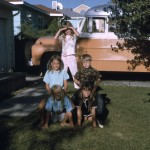
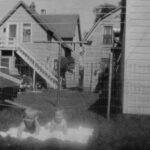 Aunt Doris and Uncle Bill always gave our parents their room. My sisters and I were never sure where they slept, but I almost think it might have been cots in the basement. Cheryl and our cousin, Pam were best friends, so Cheryl slept in Pam’s room. The rest of us slept in various places, mostly in the bus our Uncle Bill had converted into a motorhome. They could have had us stay in a motel, but they wanted us close, so we had more time to visit. The upper level of their home had been turned into a rental, and there were various renters in there, but if it was empty, we stayed there.
Aunt Doris and Uncle Bill always gave our parents their room. My sisters and I were never sure where they slept, but I almost think it might have been cots in the basement. Cheryl and our cousin, Pam were best friends, so Cheryl slept in Pam’s room. The rest of us slept in various places, mostly in the bus our Uncle Bill had converted into a motorhome. They could have had us stay in a motel, but they wanted us close, so we had more time to visit. The upper level of their home had been turned into a rental, and there were various renters in there, but if it was empty, we stayed there.
We often got to Superior, late at night…sometimes waking them up. It didn’t matter, because when we arrived, they would all get up and Aunt Doris would make us all a little snack before everyone settled into bed. Of course, we were probably up for quite a while before we were finally able to settle down. We laughed and talked continuously with Aunt Doris because she made everything fun!! She and Mom together just had so much fun. They were forever best friends. Aunt Doris had a beautiful home, and yet she was very tolerant of our noise and nonsense. We don’t ever remember her ever yelling at us or getting upset with us…Ever!! She loved us and she was always genuinely glad to see us. We all loved Aunt Doris so much that even after she and Uncle Bill divorced, we never felt like she was no longer our aunt. In fact, when our dad became ill in Canada, my sisters Caryl, Alena, Allyn, and I went up to be with him, our mom, and sister, Cheryl. Allyn needed a copy of her birth certificate to enter Canada (Pre-passport requirement). We needed to get on the road, so we had it sent 
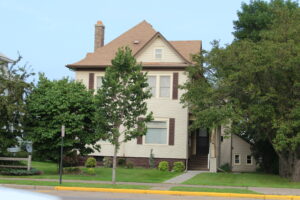 to Aunt Doris. We got to her house at around 4:00am, and without even knocking on the door, she knew we were there. She got up and made us breakfast…a big breakfast!! Aunt Doris was and is always the same with us. She is our aunt, and we love each other. For her and for us, that has always remained the same. And it always will!! Today is Aunt Doris’ 98th birthday. Happy birthday Aunt Doris!! Have a wonderful day!! We love you!!
to Aunt Doris. We got to her house at around 4:00am, and without even knocking on the door, she knew we were there. She got up and made us breakfast…a big breakfast!! Aunt Doris was and is always the same with us. She is our aunt, and we love each other. For her and for us, that has always remained the same. And it always will!! Today is Aunt Doris’ 98th birthday. Happy birthday Aunt Doris!! Have a wonderful day!! We love you!!
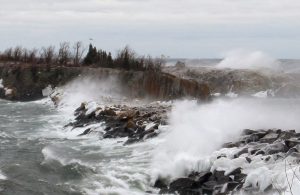
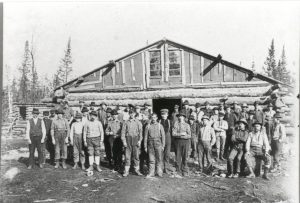 The port city of my birth, Superior, Wisconsin was founded on November 6, 1854 and incorporated March 25 1889. The city’s slogan soon became, “Where Sail Meets Rail,” because it was port connection between the shipping industry and the railroad. Much of Superior’s history parallels its sister city of Duluth’s, but Superior has been around longer than Duluth, which is also known as the Zenith City. Of course, the area had people there before that…there were Ojibwe Indians, and French traders that are known to be in the area in the early 1600s.
The port city of my birth, Superior, Wisconsin was founded on November 6, 1854 and incorporated March 25 1889. The city’s slogan soon became, “Where Sail Meets Rail,” because it was port connection between the shipping industry and the railroad. Much of Superior’s history parallels its sister city of Duluth’s, but Superior has been around longer than Duluth, which is also known as the Zenith City. Of course, the area had people there before that…there were Ojibwe Indians, and French traders that are known to be in the area in the early 1600s.
After the Ojibwe settled in the area and set up an encampment on present-day Madeline Island, the French started arriving. In 1618 voyageur Etienne Brulé paddled along Lake Superior’s south shore where he encountered the Ojibwe tribe, but he also found copper specimens. Brulé went back to Quebec with the copper samples, and a glowing report of the region. French traders and missionaries began settling the area a short time later, and a Lake Superior tributary was named for Brulé. Father Claude Jean Allouez, was one of those missionaries. His is often credited with the development of an early map of the region. Superior’s Allouez neighborhood takes its name from the Catholic missionary. The area was developed quickly after that, and by 1700 the area was crawling with French traders. The French traders developed a good working relationship with the Ojibwe people.
The Ojibwe continued to get along well with the French, but not so much the British, who ruled the area after 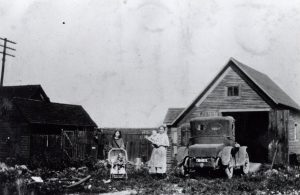
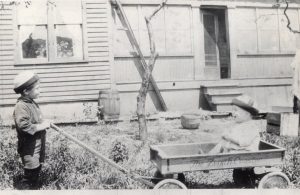 the French, but that ended with the America Revolution and the Treaty of Peace in 1783. The British weren’t as good to the Ojibwe as the French had been. Treaties with the Ojibwe would give more territory to settlers of European descent, and by 1847 the United States had taken control of all lands along Lake Superior’s south shore.
the French, but that ended with the America Revolution and the Treaty of Peace in 1783. The British weren’t as good to the Ojibwe as the French had been. Treaties with the Ojibwe would give more territory to settlers of European descent, and by 1847 the United States had taken control of all lands along Lake Superior’s south shore.
In 1854 the first copper claims were staked at the mouth of the Nemadji River…some say it was actually 1853. The Village of Superior became the county seat of the newly formed Douglas County that same year. The village grew quickly and within two years, about 2,500 people called Superior home. Unfortunately, with the financial panic of 1857, the town’s population stagnated through the end of the Civil War. The building of the Duluth Ship Canal in 1871, which was followed by the Panic of 1873. pretty much crushed Superior’s economic future. Things began to look up when in 1885, Robert Belknap and General John Henry Hammond’s Land and River Improvement Company established West Superior. Immediately they began building elevators, docks, and industrial railroads. In 1890, Superior City and West Superior merged, The city’s population fluctuated, as a boom town will, between 1887 and 1893, and then another financial panic halted progress. Over the years since then, Superior’s population has had it’s ups and down, as has it’s sister city, Duluth, but it has remained about one fourth the size of its twin across the bay.
My great grandparents, Carl and Albertine Schumacher lived in the Goodhue, Minnesota area, when my grandmother Anna was born, but my grandparents Allen and Anna Spencer lived in Superior. That is where my 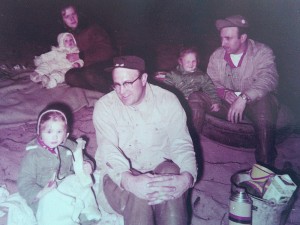
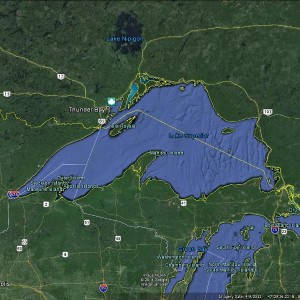 dad, Allen Spencer was born, as were my sister, Cheryl and I. We didn’t live in Superior for all of our lives, just 3 and 5 years, but the area remains in our blood, and in our hearts. It could be partly because of all the trips our family made back to Superior, but I don’t think that’s totally it, because there is just something about knowing that you came from a place, that will always make it special. Superior, Wisconsin is a very special place, that will always be a part of me and my sister, Cheryl too.
dad, Allen Spencer was born, as were my sister, Cheryl and I. We didn’t live in Superior for all of our lives, just 3 and 5 years, but the area remains in our blood, and in our hearts. It could be partly because of all the trips our family made back to Superior, but I don’t think that’s totally it, because there is just something about knowing that you came from a place, that will always make it special. Superior, Wisconsin is a very special place, that will always be a part of me and my sister, Cheryl too.

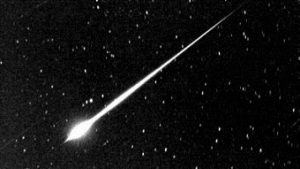 It was in the middle of World War I, on the 4th of July, 1917. The citizens of Colby, Wisconsin were busy celebrating Independence Day. Colby was originally famous for the making of Colby cheese, but it was about to be famous for something else entirely. Around 6:30, the people were setting of fireworks and everyone was having a great time, when suddenly, there was a louder-than-it-should-have-been explosion. The people were startled and began to speculate as to the origin. Some thought it was dynamite set off by some over-zealous celebrators. Then, they dismissed that thought, and some of the townspeople were concerned that when the went outside, they might see a Zeppelin dropping German bombs on the little town. In the end it turned out to be something form much further away…outer space to be exact.
It was in the middle of World War I, on the 4th of July, 1917. The citizens of Colby, Wisconsin were busy celebrating Independence Day. Colby was originally famous for the making of Colby cheese, but it was about to be famous for something else entirely. Around 6:30, the people were setting of fireworks and everyone was having a great time, when suddenly, there was a louder-than-it-should-have-been explosion. The people were startled and began to speculate as to the origin. Some thought it was dynamite set off by some over-zealous celebrators. Then, they dismissed that thought, and some of the townspeople were concerned that when the went outside, they might see a Zeppelin dropping German bombs on the little town. In the end it turned out to be something form much further away…outer space to be exact.
The streak through the sky could have been missed because of the fireworks, but the explosion was another thing entirely. The meteorite hit just west of the Zion Lutheran Church, which is still there on the corner of West Jefferson Street and North 2nd Street in Colby, Wisconsin. When the townspeople located it easily, due to the smoke trail in the sky. They found that it had broken into two pieces, with the smaller piece landing just a short distance from the church, imbedded to a depth of one foot. It weighed about 75 pounds, and was said the be intensely cold, forming frost on it when it was uncovered. The larger piece landed in Joseph Jordan’s field, imbedding itself to a depth of five feet. The depth made it difficult to dig up, so it was not unearthed until the next morning when Professor Williams secured it for a school exhibit. That piece weighed about 300 pounds, and was apparently not as cold, probably due to the time spent in the ground.
It was said that another piece had landed in Cornell, Wisconsin, which is about 60 miles away from Colby. Amazingly, none of the other small towns in the area were hit. The principal of the Colby High School assumed, 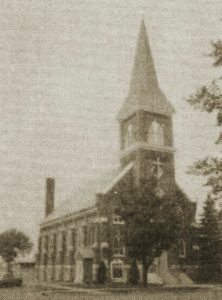 correctly as it turns out that there were likely to be other fragments too. He did some digging in the area, and is said to have found a sizeable collection of fragments. Of course, that makes sense, because as a meteor streaks through our atmosphere, the intense heat, impacting the intense cold usually causes them to break up long before they impact the Earth’s surface. Still, every so often, a particularly sturdy meteor slips through without being totally obliterated, and then we have a strike, such as the one in Colby, Wisconsin in 1917.
correctly as it turns out that there were likely to be other fragments too. He did some digging in the area, and is said to have found a sizeable collection of fragments. Of course, that makes sense, because as a meteor streaks through our atmosphere, the intense heat, impacting the intense cold usually causes them to break up long before they impact the Earth’s surface. Still, every so often, a particularly sturdy meteor slips through without being totally obliterated, and then we have a strike, such as the one in Colby, Wisconsin in 1917.
According to the Wisconsin Geological and Natural History Survey, there have been 13 documented meteorite strikes in Wisconsin since 1860. The latest one was in April 2010. Often, the way that meteorites are discovered is that someone finds a rare mineral rock, and when checked, the chemical makeup of the stone indicates that it may have originated in outer space. Of course, that doesn’t document when it happened, or if it was actually part of a documented strike. We always have been and probably always will be fascinated by the extraterrestrial.
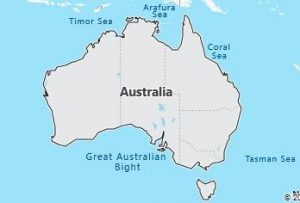 Recently, while listening to an Audible book that was read by the author, from Australia, I began to wonder about his accent, or rather how accents were developed. He had a traditional Australian accent, but I knew from history that Australia was originally part of England, in fact it was their prison island. So, why didn’t the Australians speak with an English accent? I suppose that they did, originally, but after years of living far away from their homeland, the language evolved. Languages tend to do that, even today. people come up with new slang words, and say words in funny ways, then after a while it just sounds better to them the new way. Some people, like the prisoners, might not want to sound anything like the country they came from. For that reason, or for any reason that you would work at gaining or losing as accent, the person tries not to sound like they did with their old accent, working toward their new accent, until it feels natural. Then, the children learn to speak by listening to their parents, and a new accent is born.
Recently, while listening to an Audible book that was read by the author, from Australia, I began to wonder about his accent, or rather how accents were developed. He had a traditional Australian accent, but I knew from history that Australia was originally part of England, in fact it was their prison island. So, why didn’t the Australians speak with an English accent? I suppose that they did, originally, but after years of living far away from their homeland, the language evolved. Languages tend to do that, even today. people come up with new slang words, and say words in funny ways, then after a while it just sounds better to them the new way. Some people, like the prisoners, might not want to sound anything like the country they came from. For that reason, or for any reason that you would work at gaining or losing as accent, the person tries not to sound like they did with their old accent, working toward their new accent, until it feels natural. Then, the children learn to speak by listening to their parents, and a new accent is born.
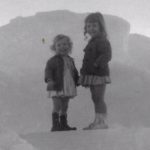
As a child, I moved from my birthplace in Superior, Wisconsin, where my Uncle Bill’s family lived, to Casper, Wyoming, where my mom’s family lived. As the years went by, unbeknownst to us, my sister, Cheryl and I began to lose our accent. I didn’t even know we had an accent. Of course, when the change was pointed out to us, that we had an accent, we were shocked. We thought our Wisconsin cousins had an accent. Of course, we both did. Theirs was a Midwestern accent, and ours was a Western accent. It’s really strange to consider that the United States has basically four, and maybe five different accents. Somehow, I didn’t think of my own accent as being an accent, until my cousin mentioned it. I think we all recognize a Southern accent, but some of the others are a little bit more subtle, except maybe the Eastern accent. When about sounds like aboot, and Boston sounds like Baston, it isn’t something that is easily missed. It stands out as much as the Southern y’all 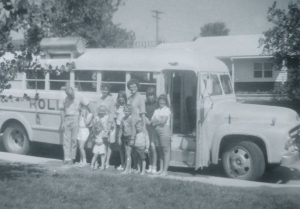 that we are all so fond of.
that we are all so fond of.
Language is ever evolving. We have created new words for things we didn’t have before, or slang words for things we have always had. We have made up words just to be funny, and somehow they new words stuck, and even got added to the dictionary at some point. Words that were unacceptable grammar in times past, suddenly are acceptable. The way we talk compared to the way of just one or two generations ago, can be enough different that if we saw them side by side, we would almost never know that the two dialects started out as one.
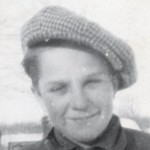
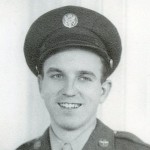
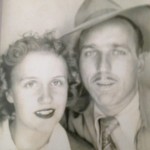 My dad…when I think of him, I always feel such a sense of pride in who he was. He had lived so great a life, seen so many things, gone places, and while many people might not think his life was so grand, I did. My dad, Allen Spencer, was born on April 27, 1924 in Superior, Wisconsin, to Allen and Anna (Schumacher) Spencer. He was the third of their four children, and one of two rather mischievous boys. The family owned a farm, and the children helped with the chores there. His dad worked for the Great Northern Railroad as a carpenter, building and repairing the seats on the train, and any other carpentry work needed. That fact gave the children Laura, William (Bill), Allen (my dad), and Ruth, the unique privilege of having a pass to ride the train for free, as a dependent of their dad, making their trips to school easier, though not without adventure. As I said, the boys were mischievous, and boarding the train in the normal, everyday way was just too boring. They boys hopped on the moving train, every chance they got, always hoping not to be caught and scolded. They were told repeatedly not to hop on the train, because it was unsafe, but they were boys, and they liked the danger.
My dad…when I think of him, I always feel such a sense of pride in who he was. He had lived so great a life, seen so many things, gone places, and while many people might not think his life was so grand, I did. My dad, Allen Spencer, was born on April 27, 1924 in Superior, Wisconsin, to Allen and Anna (Schumacher) Spencer. He was the third of their four children, and one of two rather mischievous boys. The family owned a farm, and the children helped with the chores there. His dad worked for the Great Northern Railroad as a carpenter, building and repairing the seats on the train, and any other carpentry work needed. That fact gave the children Laura, William (Bill), Allen (my dad), and Ruth, the unique privilege of having a pass to ride the train for free, as a dependent of their dad, making their trips to school easier, though not without adventure. As I said, the boys were mischievous, and boarding the train in the normal, everyday way was just too boring. They boys hopped on the moving train, every chance they got, always hoping not to be caught and scolded. They were told repeatedly not to hop on the train, because it was unsafe, but they were boys, and they liked the danger.
Growing up, the train adventures weren’t the only ones the boys had, and probably not the most dangerous either. When dad was about 15 and his brother, Uncle Bill about 17, the boys decided to take the summer and go look for work. They didn’t make reservations at hotels, or have previously lined up jobs, but rather hit the road and did odd jobs in the towns they came across. One time there was no room in the local hotel, so the local sheriff allowed them to sleep in the jail…the first and last time either of them was in jail, as far as I know. If I know my dad and my uncle, they thought it was a great adventure…even though their mother would have been appalled. Or maybe she would have been grateful to the sheriff for keeping her boys off the street.
When Dad was 17, he left home to go work at Douglas Aircraft Company in Santa Monica, California, building airplanes. I often wonder if it was his work there that made him a prime candidate for the position he held in World War II, as a top turret gunner and flight engineer on a B-17 based at Great Ashfield, Suffolk, England. I don’t know his thoughts on being in one of the countries where his ancestors had hailed from, but to my genealogist’s eyes, it would have been the best gift ever given…had it not been for the war, of course. To find himself in the “old stomping grounds” of many of his ancestors…well, it would have been beyond awesome. Dad, decided that he didn’t need much, and so he sent most of his pay home to be put in saving, telling his mom, that if she needed it, she was to use it, because he could always get a job when he got home. In war, times are tough, and Dad wanted to make sure that his family, back home in Superior was well and had enough money to get by. During his R and R time, Dad spent time in Miami, Florida and Galveston, Texas, and of course his training for service had taken place on several air bases across the United States. Dad had always loved to travel, so I’m sure his wanderer’s heart took great pleasure in the many locations he found himself in.
It was, in fact, his wanderer’s heart that brought him across the path of my Aunt Virginia and her husband at the time. She later introduced him to her sister and his future wife, my mom, Collene Byer. Mom was totally smitten by Dad, immediately thinking that he was the most handsome man she had ever seen. Before long, she loved him immensely, but she was a school girl, and had to wait a while to actually marry him. As was more common in those days, my dad was twelve years older than my mom, but theirs was a love that would last until his passing in 2007. Even after his passing, Mom had no desire to see anyone else. She just couldn’t imagine it. He was the only love of her life.
Dad never lost the love of travel, though his married life settled him first for several years in Superior, Wisconsin, and the for the rest of his life in Casper, Wyoming. He wanted to show his family the places he loved, most importantly the United States. He often told us that this was a beautiful country, and not only should we try to see it, we should drive, because you could see much more from the ground than from a plane. Of course, for most of us time constraints don’t allow for cross country drives, but after the flight to get there, we try to see the area surrounding our destination. Dad, I’m certain, would have viewed that type of travel with a measure of skepticism. Still, he loved to hear about our travels. He always seemed to have a far away look on 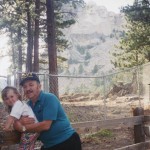
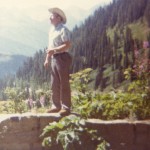
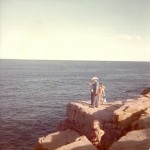 his face, because he could picture the same place in his mind…you see, he had most likely been there before, and he was so happy that we had followed in his footsteps. Today would have been my dad’s 96th birthday. Happy birthday in Heaven, Dad. I know you and Mom are having a wonderful time. We love and miss you very much and can’t wait to see you again.
his face, because he could picture the same place in his mind…you see, he had most likely been there before, and he was so happy that we had followed in his footsteps. Today would have been my dad’s 96th birthday. Happy birthday in Heaven, Dad. I know you and Mom are having a wonderful time. We love and miss you very much and can’t wait to see you again.
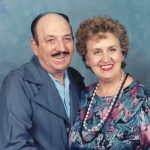
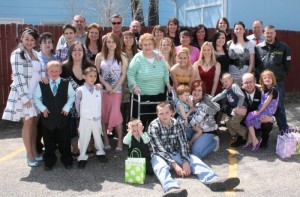 Five years is such a long time, and yet such a short time. I simply can’t believe that my mom has been in Heaven that long. The day she left us is still vivid in my memory files. It is a picture I will never get out of my head. There are a few scenes in my head that are that way. I try not to focus on them. They don’t need to be re-run to keep their memory alive. I try to focus on the happier past…the memories of the good times with my mom.
Five years is such a long time, and yet such a short time. I simply can’t believe that my mom has been in Heaven that long. The day she left us is still vivid in my memory files. It is a picture I will never get out of my head. There are a few scenes in my head that are that way. I try not to focus on them. They don’t need to be re-run to keep their memory alive. I try to focus on the happier past…the memories of the good times with my mom.
Collene Spencer was a bit of a shy girl, but she knew a good looking man when she saw one. For her, falling in love with my dad was like breathing…and she never looked back. Mom didn’t really like school, so that was not something that had any hold on her. She wanted to be married and have a family. I don’t really know if that had been her dream, before she met my dad, but it certainly was after that meeting. Their honeymoon was a move East to Superior, Wisconsin where Dad’s family was from and still lived. Mom’s family liked the idea too, because it gave them someplace to go visit. It was a beautiful place to visit too, so that was a plus. While mom eventually wanted to and did move back, her family wished she had stayed, so they could justify more visits.
After having their first two daughters, Cheryl Masterson, and me in Superior, Mom and Dad had the rest, Caryl Reed, Alena Stevens, and Allyn Hadlock here in Casper, Wyoming, where Mom’s family mostly lives. I have always thought we were very blessed to have so much family around us. That has never really been made so clear as when we became orphans. That’s when family really means a lot. My sisters, and our families first and foremost, of course, but aunts, uncles, and especially cousins have stepped in too…making us feel loved and comforted. I will always miss my parents…until the day I join them in Heaven. They taught us so many things, 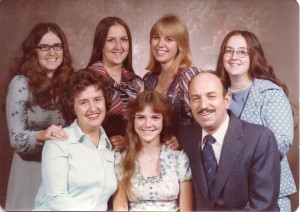
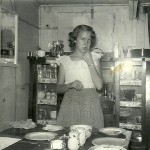 and it is because of their upbringing that we are the women we are today. The best we can do is make them proud of the people their children have become. I can’t believe that my mom has been in Heaven for five long years now. It seems an impossible number of years. While it seems just seconds ago to those who are there, mostly because that’s how eternity works, for the rest of us, the days feel much longer. We love and miss you Mom, and we can’t wait to see you again.
and it is because of their upbringing that we are the women we are today. The best we can do is make them proud of the people their children have become. I can’t believe that my mom has been in Heaven for five long years now. It seems an impossible number of years. While it seems just seconds ago to those who are there, mostly because that’s how eternity works, for the rest of us, the days feel much longer. We love and miss you Mom, and we can’t wait to see you again.
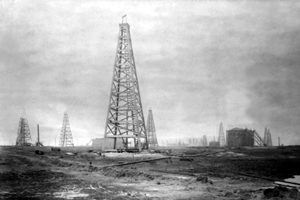 While most of the economy in Southeast Texas depended on agriculture, cattle ranching, and the lumber business in the 19th century, things were about to change. The presence of oil was known, but untapped until 1901 when the oil industry would change the landscape of the region. Uses for oil date back many years. In the 1500s, the Spanish used oil from seeps near Sabine Pass for caulking their ships, and to the north, settlers near Nacogdoches used seeping oil for lubricants before 1800. There were numerous discoveries in east and central Texas in the later 1800s, especially at Corsicana in 1896. Attempts were made to drill wells at Spindletop 1893 and 1896 and at Sour Lake in 1896, but they had no successful oil production along the Gulf Coast until the Lucas Gusher came in on Spindletop Hill on January 10, 1901.
While most of the economy in Southeast Texas depended on agriculture, cattle ranching, and the lumber business in the 19th century, things were about to change. The presence of oil was known, but untapped until 1901 when the oil industry would change the landscape of the region. Uses for oil date back many years. In the 1500s, the Spanish used oil from seeps near Sabine Pass for caulking their ships, and to the north, settlers near Nacogdoches used seeping oil for lubricants before 1800. There were numerous discoveries in east and central Texas in the later 1800s, especially at Corsicana in 1896. Attempts were made to drill wells at Spindletop 1893 and 1896 and at Sour Lake in 1896, but they had no successful oil production along the Gulf Coast until the Lucas Gusher came in on Spindletop Hill on January 10, 1901.
Spindletop Hill was a salt dome oil field, that was located in the southern portion of Beaumont, Texas. People had long suspected that oil might be under the hill as the area had been known for its sulfur springs and 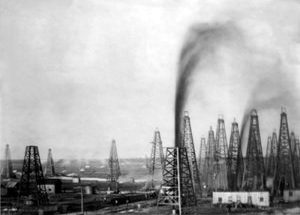 bubbling gas seepages that would ignite if lit. Then in August, 1892, several men including George W. O’Brien, George W. Carroll, and Pattillo Higgins formed the Gladys City Oil, Gas, and Manufacturing Company to do exploratory drilling on Spindletop Hill.
bubbling gas seepages that would ignite if lit. Then in August, 1892, several men including George W. O’Brien, George W. Carroll, and Pattillo Higgins formed the Gladys City Oil, Gas, and Manufacturing Company to do exploratory drilling on Spindletop Hill.
By September 1901, there were at least six successful wells on Gladys City Company lands. Wild speculation drove land prices around Spindletop to incredible heights. One man who had been trying to sell his tract there for $150 for three years sold his land for $20,000; the buyer promptly sold to another investor within fifteen minutes for $50,000. One well, representing an initial investment of under $10,000, was sold for $1,250,000. Legal entanglements and multimillion-dollar deals became almost commonplace. An estimated $235 million had been invested in oil that year in Texas; while some had made fortunes, others lost everything.
Following the success of the oil industry at Spindletop Hill, many people, including my grandparents, Allen and 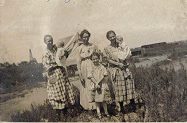 Anna Spencer would make their way to Texas in search of a better life. They would settle on the oilfields near Ranger, Texas. They didn’t find any oil fields, so their income came from his work for other people in the oilfields. These days people working in the oilfield business make good money, but as near as I can tell oilfield workers averaged about 90 cents an hour in 1919, which would be about $11.74 an hour today. That’s pretty poor wages, especially for the oilfield, but I suppose people didn’t realize how valuable they really were. Needless to say, the oilfield was not the place my grandfather would choose to make his living, and eventually they returned to Wisconsin where he went to work for the railroad.
Anna Spencer would make their way to Texas in search of a better life. They would settle on the oilfields near Ranger, Texas. They didn’t find any oil fields, so their income came from his work for other people in the oilfields. These days people working in the oilfield business make good money, but as near as I can tell oilfield workers averaged about 90 cents an hour in 1919, which would be about $11.74 an hour today. That’s pretty poor wages, especially for the oilfield, but I suppose people didn’t realize how valuable they really were. Needless to say, the oilfield was not the place my grandfather would choose to make his living, and eventually they returned to Wisconsin where he went to work for the railroad.

